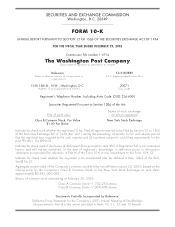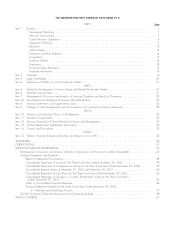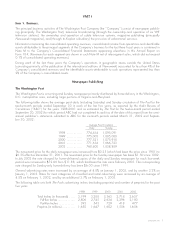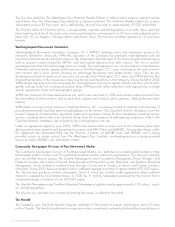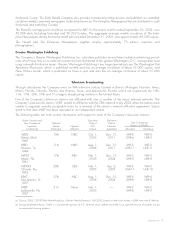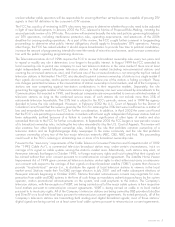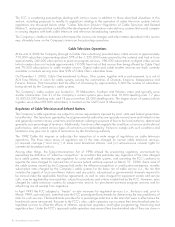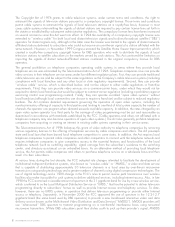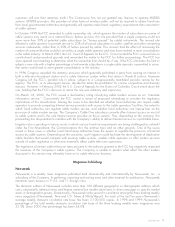Washington Post 2002 Annual Report Download - page 9
Download and view the complete annual report
Please find page 9 of the 2002 Washington Post annual report below. You can navigate through the pages in the report by either clicking on the pages listed below, or by using the keyword search tool below to find specific information within the annual report.a cost-of-service proceeding that higher rates are needed to earn a reasonable return on investment, which the
Commission established in March 1994 to be 11.25%. The FCC’s rules also permit franchising authorities to
regulate equipment rentals and service and installation rates on the basis of a cable operator’s actual costs plus an
allowable profit which is calculated from the operator’s net investment, income tax rate and other factors.
As discussed in the preceding section, under the ‘‘must-carry’’ requirements of the 1992 Cable Act, a commercial
television broadcast station may, subject to certain limitations, insist on carriage of its signal on cable systems
located within the station’s market area. Similarly, a noncommercial public station may insist on carriage of its signal
on cable systems located within either the station’s predicted Grade B signal contour or 50 miles of the station’s
transmitter. As a result of these obligations (the constitutionality of which has been upheld by the U.S. Supreme
Court), certain of the Company’s cable systems have had to carry broadcast stations that they might not otherwise
have elected to carry, and the freedom the Company’s systems would otherwise have to drop signals previously
carried has been reduced.
Also as explained in the preceding section, at three-year intervals beginning in October 1993 commercial broad-
casters have had the right to forego must-carry rights and insist instead that their signals not be carried without their
prior consent. The Company’s cable systems have been able to continue carrying virtually all of the stations insisting
on retransmission consent without having to agree to pay any stations for the privilege of carrying their signals.
However, some commitments have been made to carry other program services offered by a station or an affiliated
company, to provide advertising availabilities on cable for sale by a station and to distribute promotional announce-
ments with respect to a station. Many of these agreements between broadcast stations and the Company’s cable
systems expired at the end of 2002 and the expired agreements were replaced by new agreements having
comparable terms.
As has already been noted, in January 2001 the FCC determined that, pending further inquiry, only television
stations broadcasting in a DTV-only mode could require local cable systems to carry their DTV signals. The FCC
currently is conducting another inquiry to decide whether it should require cable systems to carry both the analog and
the DTV signals of local television stations. Such an extension of must-carry requirements could result in the Compa-
ny’s cable systems being required to delete some existing programming to make room for broadcasters’ DTV
channels.
Various other provisions in current federal law may significantly affect the costs or profits of cable television systems.
These matters include a prohibition on exclusive franchises, restrictions on the ownership of competing video delivery
services, restrictions on transfers of cable television ownership, a variety of consumer protection measures, and
various regulations intended to facilitate the development of competing video delivery services. Other provisions
benefit the owners of cable systems by restricting regulation of cable television in many significant respects, requiring
that franchises be granted for reasonable periods of time, providing various remedies and safeguards to protect
cable operators against arbitrary refusals to renew franchises, and limiting franchise fees to 5% of revenues.
Apart from its authority under the 1992 Cable Act and the Telecommunications Act of 1996, the FCC regulates
various other aspects of cable television operations. Since 1990 cable systems have been required to black out from
the distant broadcast stations they carry syndicated programs for which local stations have purchased exclusive
rights and requested exclusivity. Other long-standing FCC rules require cable systems to delete under certain
circumstances duplicative network programs broadcast by distant stations. The FCC also imposes certain technical
standards on cable television operators, exercises the power to license various microwave and other radio facilities
frequently used in cable television operations, and regulates the assignment and transfer of control of such licenses.
In addition, pursuant to the Pole Attachment Act, the FCC exercises authority to disapprove unreasonable rates
charged to cable operators by telephone and power utilities for utilizing space on utility poles or in underground
conduits (although states may reclaim exclusive jurisdiction over these matters by certifying to the FCC that they
regulate the rates, terms and conditions of pole attachments, and some states in which the Company has cable
operations have so certified). A number of cable operators (including the Company’s Cable One subsidiary) are
using their cable systems to provide not only television programming but also Internet access. In January 2002, the
U.S. Supreme Court ruled that the FCC’s authority under the Pole Attachment Act extends to all pole attachments by
cable operators, including those attachments used to provide Internet access. Thus, except where individual states
have assumed regulatory responsibility, the rates charged by utilities for pole or conduit access by cable companies
are subject to FCC rate regulation regardless of whether or not the cable companies are providing Internet access as
well as the delivery of television programming.
2002 FORM 10-K 7

